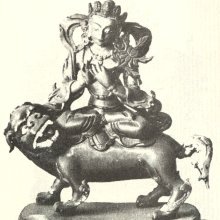Simhavahana, Siṃhavāhana, Simha-vahana: 5 definitions
Introduction:
Simhavahana means something in Jainism, Prakrit, Hinduism, Sanskrit, the history of ancient India. If you want to know the exact meaning, history, etymology or English translation of this term then check out the descriptions on this page. Add your comment or reference to a book if you want to contribute to this summary article.
Images (photo gallery)
In Jainism
General definition (in Jainism)
Source: archive.org: TrisastisalakapurusacaritraSiṃhavāhana (सिंहवाहन) is the son of Kanakodarī and Sukaṇṭha (king of Vāruṇa), according to the Jain Ramayana and chapter 7.2 [Rāvaṇa’s expedition of conquest] of Hemacandra’s 11th century Triṣaṣṭiśalākāpuruṣacaritra: an ancient Sanskrit epic poem narrating the history and legends of sixty-three illustrious persons in Jainism.
Accordingly, as Muni Amitagati said to Añjanā (daughter of Hṛdayasundarī and Mahendra): “[...] When he (Damayanta, son of Pryanandin) fell, he became the son, Siṃhacandra, of King Haricandra, lord of the city Mṛgāṅka, by Priyaṅgulakṣmī. He professed the Jain faith, died in the course of time and attained divinity. When he fell, he became the son, Siṃhavāhana, of King Sukaṇṭha and Kanakodarī in the city Vāruṇa on this same Vaitāḍhya. After enjoying sovereignty for a long time, he took the vows tinder Muni Lakṣmīdhara in the congregation of Śrī Vimala. [...]”.

Jainism is an Indian religion of Dharma whose doctrine revolves around harmlessness (ahimsa) towards every living being. The two major branches (Digambara and Svetambara) of Jainism stimulate self-control (or, shramana, ‘self-reliance’) and spiritual development through a path of peace for the soul to progess to the ultimate goal.
India history and geography
Source: Heidelberg: Glory of the Tiruvanantapuram Padmanabhasvami TempleSiṃhavāhana (सिंहवाहन) refers to the vehicle used (to carry the deity) on the first day of the festival, according to the Syānandūrapuravarṇana-prabandha by Svāti-Tirunāḷ (1813-1846) (one of the rulers of Travancore) which deals with the different activities of the Thiruvananthapuram Temple, including ceremonies and festivals.—In the sixth chapter, Utsavapraśaṃsā, there is a detailed account of the annual festival with all its aspects, which even includes the daily procession and the specifics of the vāhanas (vehicles) that are used to carry the deity, [e.g., first day—siṃhavāhana]

The history of India traces the identification of countries, villages, towns and other regions of India, as well as mythology, zoology, royal dynasties, rulers, tribes, local festivities and traditions and regional languages. Ancient India enjoyed religious freedom and encourages the path of Dharma, a concept common to Buddhism, Hinduism, and Jainism.
Languages of India and abroad
Sanskrit dictionary
Source: DDSA: The practical Sanskrit-English dictionarySiṃhavāhana (सिंहवाहन).—an epithet of Śiva.
Derivable forms: siṃhavāhanaḥ (सिंहवाहनः).
Siṃhavāhana is a Sanskrit compound consisting of the terms siṃha and vāhana (वाहन).
Source: Cologne Digital Sanskrit Dictionaries: Monier-Williams Sanskrit-English Dictionary1) Siṃhavāhana (सिंहवाहन):—[=siṃha-vāhana] [from siṃha] mfn. idem
2) [v.s. ...] m. Name of Śiva, [Mahābhārata]
3) Siṃhavāhanā (सिंहवाहना):—[=siṃha-vāhanā] [from siṃha-vāhana > siṃha] f. Name of Durgā, [cf. Lexicographers, esp. such as amarasiṃha, halāyudha, hemacandra, etc.]
[Sanskrit to German]
Sanskrit, also spelled संस्कृतम् (saṃskṛtam), is an ancient language of India commonly seen as the grandmother of the Indo-European language family (even English!). Closely allied with Prakrit and Pali, Sanskrit is more exhaustive in both grammar and terms and has the most extensive collection of literature in the world, greatly surpassing its sister-languages Greek and Latin.
See also (Relevant definitions)
Partial matches: Vahana, Simha.
Full-text: Vahana, Utsavaprashamsa, Lakshmidhara, Haricandra, Mriganka, Sukantha, Simhacandra, Priyangulakshmi.
Relevant text
Search found 2 books and stories containing Simhavahana, Siṃhavāhana, Simha-vahana, Siṃha-vāhana, Siṃhavāhanā, Siṃha-vāhanā; (plurals include: Simhavahanas, Siṃhavāhanas, vahanas, vāhanas, Siṃhavāhanās, vāhanās). You can also click to the full overview containing English textual excerpts. Below are direct links for the most relevant articles:
Sripura (Archaeological Survey) (by Bikash Chandra Pradhan)
Stone Images (5): Sakta Images < [Chapter 3 - Sculptural Programme]
Trishashti Shalaka Purusha Caritra (by Helen M. Johnson)
Part 3: Previous birth of Añjanā < [Chapter III - Hanumat’s birth and Varuṇa’s subjection]
Related products


